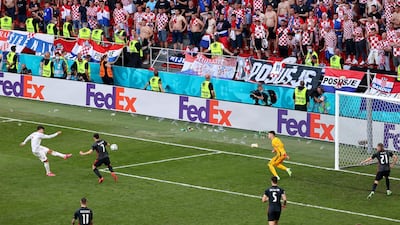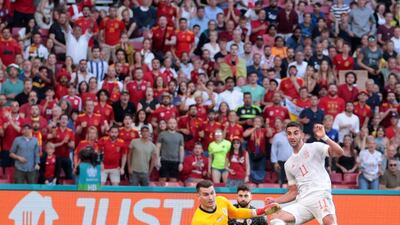The usual wish from coaches entering the knockout phase of a tournament is for, please, no extra-time. Their players are tired enough, without half an hour’s further effort or mounting anxiety.
But for Spain, it seems, extra time is just what they needed. That’s extra time in the sense of more time to find their higher gears, to get into a stride.
Spain embarked on Euro 2020 still playing catch-up. They effectively lost a great chunk of preparation time ahead of the tournament because of a positive Covid test for their captain, Sergio Busquets. He had to self-isolate, ruling him out of the first two matches, and, because of the risk of contagion, the rest of the squad were restricted in how intensely they could practice together.
It showed. Spain still needed more time to achieve fluency, to establish passing relationships across a young squad when they took the field against Sweden to open their campaign. Through the 90 minutes they dominated possession without finding the quick, surprising final pass. They drew 0-0.
They still needed time to finesse their pass-and-move by the end of their draw with Poland, 1-1 after a catalogue of missed chances.
Once the cork was out of the bottle, head coach Luis Enrique promised, the goals would flow. Into their third fixture, his players thoroughly answered his promise. They have scored 10 times - although two of those were Slovakian own goals in that 5-0 win - in their last two matches, their last-16 tie with Croatia as frenetic and end-to-end as any in a wild first round of knockouts across Euro 2020.
They reached Friday's showdown with Switzerland via extra-time, scoring their fourth and fifth in a 5-3 victory over Croatia in the added half-hour, having let a 3-1 lead evaporate late in normal time.
Extra time, then, has been their ally, Spain’s saviour after a slow start. And those who remember clearly the golden age of the national team, when they strung together successive European Championship titles in 2008 and 2012 and a World Cup triumph in between, can glimpse a promising omen.
Extra-time was the space where that Spain vintage turned from podium-candidates to potential champions. They shrugged off a long-term inferiority complex against Italy after extra time, and penalties, on the way to winning Euro 2008. They beat the Netherlands with an extra-time Andres Iniesta volley in the World Cup final in South Africa.
There is more than coincidence in Spain exerting themselves the longer a match goes on. Keeping the ball is their forte. Their ratio of possession to goals can be exasperatingly low - as it was over 120 minutes of their last-16 tie against Russia at the last World Cup: Spain had well over 70 per cent of the ball, and lost on spot-kicks - against opponents who defend deep and diligently. However, the skilful circulation of passes preserves energies far better than forever chasing it. In a battle that comes down to stamina, keeping the ball is key.
This Spain squad has youth on its side, too, and some protection against the fatigue that almost all players have brought to the European championship from club seasons of unprecedented rigour, because of the compacted calendar.
Take the strikers Ferran Torres, 21, and Pablo Sarabia, 29. They have both refreshed Spain’s campaign, scoring or setting up seven goals between them in the last two matches. Both play at clubs, Manchester City and Paris Saint-Germain, where last season brought long runs in many competitions but where there are deep resources in the attacking positions.
That meant rest for players outside the established first XI. Torres played less than half as many minutes for City as Ruben Dias did. Sarabia was on the pitch for PSG less than half as long last season as Kylian Mbappe was.
Given their form, it will be hard for Enrique to leave either Sarabia or Torres out against Switzerland, whose confidence is soaring after the expert way they contained France for much of their last-16 tie and came back from two goals down to drag the contest into extra-time and to a penalty shoot-out.
“That match showed that in this European Championship anybody can cause problems and beat anybody else,” said Torres of the Swiss eliminating the world champions. “But it didn’t shock us so much. We have played Switzerland and know they are very tough and make things very hard for you.”
Torres’s reference points were the meetings in the Uefa Nations League last October and November, when Spain beat Switzerland by a narrow 1-0 in Madrid, and, in Basel, required an 89th-minute equaliser to draw 1-1. Stamina saved Spain that day. They believe they have a deep well of it, although they will still intend to take more care about avoiding extra-time if, as in the last round, they take the lead within the 90 minutes.





















